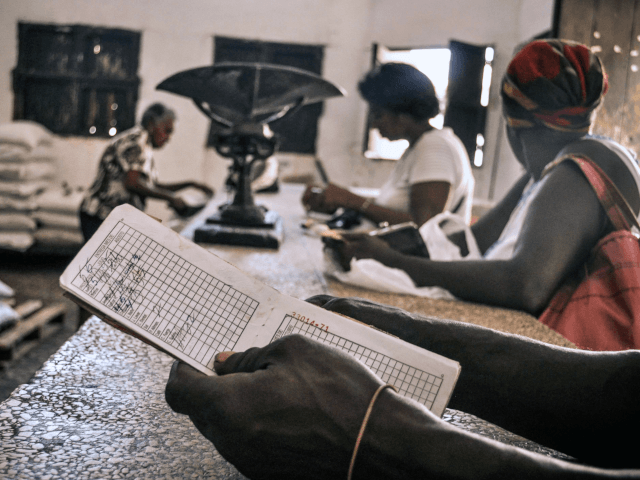Cuban Interior Commerce Minister Betsy Díaz Velázquez claimed that most Cubans support a brutal new food ration policy that has forced those in major cities to stand on grocery lines for hours, the Cuban interest site CiberCuba reported on Wednesday.
Díaz Velázquez, who implemented the new policies on May 10, appeared on the Cuban government propaganda show Mesa Redonda (“Round Table”) on Tuesday to defend the ration system. Cuba has subjected all citizens to a ration card since the 1960s, but shortages remained stable while the island nation’s parasitic economy could depend on the Soviet Union and later Venezuela. With Venezuela on the brink of becoming a failed state, Cuba has now returned to a situation similar to the 1990s “special period” that followed the fall of the USSR.
The regime of dictator Raúl Castro blamed American President Donald Trump for the ongoing shortages.
“Since the announcement of the change in the implementation of Title III we have had cases of importers and banking institutions that do not want to operate with us. That has created shortages and with that hoarding, uncertainty, panic,” Díaz said on Mesa Redonda.
Title III of the Helms-Burton Act grants Americans the right to sue corporations that traffic in property stolen from them following Fidel Castro’s violent takeover of the country in 1959. President Trump ended a suspension of that right that had existed since 1996, when the law passed, this month, triggering a wave of lawsuits against American and European corporations working with the Castro regime. Americans filed their first lawsuit against Carnival Corporation, whose cruises dock in American-owned ports in Havana and Santiago de Cuba. There is no evidence the Carnival lawsuit has affected shipments of food to the country.
While the Helms-Burton lawsuits began this month, Cuba’s food crisis has been years in the making. As early as 2016 – the year Venezuela’s food crisis became acute, and the year President Barack Obama visited the island to mend relations with the Castro regime – rumors circulated in Cuba of the coming of a second “special period.”
Blaming the United States, Díaz said that the Castro regime had “adopted measures to guarantee priority goods [are available] and expand the offerings of chicken, oil, or eggs.” She said Cubans were generally pleased with the rationing.
“There are a variety of different opinions, most consider these [rations] good and even insist on us continuing to ration products,” she said.
The May 10 announcement listed soap, wheat, chicken, and other basic home goods on a new ration list that limits significantly the number or amount of each item a family can buy. At the time, Díaz said it was necessary to ensure “just and rational distribution” of goods and to “prevent hoarding.”
The Cuban Communist Party newspaper Granma has attempted to raise spirits with a barrage of propaganda praising the resilience of the Cuban spirit. “Our Greatest Strength Is in Our Human Capital,” a headline read on Wednesday. “We have all the conditions to move forward and overcome the adversities imposed on us by circumstances, including the cruel blockade that attempts to asphyxiate us economically,” the article, citing a Communist Party official, said.
Cuban “President” Miguel Díaz-Canel, who answers to Castro, also appears on the pages of Granma telling Cubans, “We have enough intelligence and human potential and the material necessary to confront any task, no matter how complex.”
Contrary to these assurances, Cubans have largely met the new policies with outrage.
Luz Escobar, a reporter with 14 y Medio, published video and photos on Twitter Thursday of a long line to buy chicken. One woman told Escobar she had been in the line for three hours for some chicken; others conspired to use their friends’ children to gain sympathy and cut the line.
“What a bunch of scoundrels,” an angry woman can be heard saying in the video.
#Cuba "Estoy aquí desde las ocho de la mañana", dice una mujer que se preocupa porque ve salir a las personas con dos bolsas de pollo. #LaColaChallenge pic.twitter.com/MZp0R8BOK8
— Luz_Cuba 🇺 (@Luz_Cuba) May 16, 2019
— Luz_Cuba 🇺 (@Luz_Cuba) May 16, 2019
“I can’t survive on the ration book alone,” Ángel Marcelo Rodríguez Pita, an economist, told the U.S.-based Martí news broadcaster. “What comes from the bodega is a little oil, a little salt, a little sugar and a few beans. Nobody can survive on this.”
Some, seeing the crisis coming, began saving up early. A woman who identified herself as Margot Bustamante told the Cuban independent news outlet 14 y Medio that she has been stocking up on sardines, toilet paper, powdered milk, soap, and candles because she lived through the 1970s. Fidel Castro implemented a policy known as the “10 million sugar harvest” to put all the nation’s resources into harvesting 10 million tons of sugar by 1970. Like all communist endeavors, the plan failed, leaving the population starving and desperate. Bustamante also lived through the 1990s “special period,” when Cubans began inventing “cuisines” such as “coffee” made of split peas and pizza topped with melted condoms as a substitute for cheese.
Díaz, the interior minister, blamed “hoarders” like Bustamante in part for the shortage and police have begun surrounding groceries and bodegas to ensure the same person does not buy products more often than the government would like.

COMMENTS
Please let us know if you're having issues with commenting.